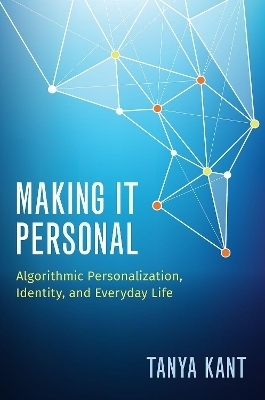
Making it Personal
Algorithmic Personalization, Identity, and Everyday Life
Seiten
2020
Oxford University Press Inc (Verlag)
978-0-19-090508-8 (ISBN)
Oxford University Press Inc (Verlag)
978-0-19-090508-8 (ISBN)
Making it Personal offers a thoughtful analysis and up-to-date contextualization of the issues around of algorithmic personalization, bridging the gap between algorithmic intervention and individual user perception, experience, and negotiation.
Targeted advertisements, tailored information feeds, and recommended content are now common and somewhat inescapable components of our everyday lives. With the help of searches, browsing history, purchases, likes, and other digital interactions, technological experiences are now routinely "personalized." Companies with access to this information often downplay the fact that users' personal data serves as a key form of monetization, and their privacy policies tend to use the terms "personalization" and "customization" to legitimize the practice of tracking and algorithmically anticipating users' daily movements. In Making it Personal, Tanya Kant sheds light on the dilemmas of algorithmic personalization, exploring such key contemporary questions as: What do users really know about the algorithms that guide their online experiences and social media presence? And if personalization practices seek to act on our behalf, then how can users constitute, retain, or relinquish their autonomy and sense of self?
At the heart of the book are new interviews and focus groups with web users who-through a myriad of resistant, tactical, resigned or trusting engagements-encounter algorithmic personalization as part of their lived experience on the web. Tanya Kant proposes that for those who encounter it, algorithmic personalization creates epistemic uncertainties that can emerge as trust or anxiety, produces an ongoing struggle for autonomy between user and system, and even has the power to intervene in identity constitution. In doing so, algorithmic personalization does not just generate "filter bubbles" for individuals' worldviews, but also creates new implications for knowledge production, the deployment of cultural capital as an algorithmic tactic, and, above all, formations of identity itself.
Targeted advertisements, tailored information feeds, and recommended content are now common and somewhat inescapable components of our everyday lives. With the help of searches, browsing history, purchases, likes, and other digital interactions, technological experiences are now routinely "personalized." Companies with access to this information often downplay the fact that users' personal data serves as a key form of monetization, and their privacy policies tend to use the terms "personalization" and "customization" to legitimize the practice of tracking and algorithmically anticipating users' daily movements. In Making it Personal, Tanya Kant sheds light on the dilemmas of algorithmic personalization, exploring such key contemporary questions as: What do users really know about the algorithms that guide their online experiences and social media presence? And if personalization practices seek to act on our behalf, then how can users constitute, retain, or relinquish their autonomy and sense of self?
At the heart of the book are new interviews and focus groups with web users who-through a myriad of resistant, tactical, resigned or trusting engagements-encounter algorithmic personalization as part of their lived experience on the web. Tanya Kant proposes that for those who encounter it, algorithmic personalization creates epistemic uncertainties that can emerge as trust or anxiety, produces an ongoing struggle for autonomy between user and system, and even has the power to intervene in identity constitution. In doing so, algorithmic personalization does not just generate "filter bubbles" for individuals' worldviews, but also creates new implications for knowledge production, the deployment of cultural capital as an algorithmic tactic, and, above all, formations of identity itself.
Tanya Kant is Lecturer in Media and Cultural Studies (Digital Media) at the University of Sussex, UK. She is Co-Managing Editor of the open access, multimedia publishing platform REFRAME.
Introduction: Making it Personal
Chapter Two: The Drive to Personalize
Chapter Three: Me, Myself, and the Algorithm
Chapter Four: Hiding Your "Scuzzy Bits"
Chapter Five: Autoposting the Self into Existence
Chapter Six: Validating the Self Through Google
Conclusion: Removing 'the Personal' from Personalization
Bibliography
Appendix
Endnotes
| Erscheinungsdatum | 25.03.2020 |
|---|---|
| Zusatzinfo | 11 figures and tables |
| Verlagsort | New York |
| Sprache | englisch |
| Maße | 243 x 160 mm |
| Gewicht | 513 g |
| Themenwelt | Mathematik / Informatik ► Informatik ► Grafik / Design |
| Sozialwissenschaften ► Kommunikation / Medien ► Journalistik | |
| Sozialwissenschaften ► Kommunikation / Medien ► Kommunikationswissenschaft | |
| Sozialwissenschaften ► Soziologie ► Empirische Sozialforschung | |
| Wirtschaft | |
| ISBN-10 | 0-19-090508-5 / 0190905085 |
| ISBN-13 | 978-0-19-090508-8 / 9780190905088 |
| Zustand | Neuware |
| Informationen gemäß Produktsicherheitsverordnung (GPSR) | |
| Haben Sie eine Frage zum Produkt? |
Mehr entdecken
aus dem Bereich
aus dem Bereich
Schritt für Schritt zu Vektorkunst, Illustration und Screendesign
Buch | Hardcover (2023)
Rheinwerk (Verlag)
CHF 55,85
Fit für Studium und Ausbildung
Buch | Softcover (2022)
Rheinwerk (Verlag)
CHF 34,85
Die Kreativmaschine. Next Edition
Buch | Softcover (2024)
Verlag Hermann Schmidt
CHF 55,95


